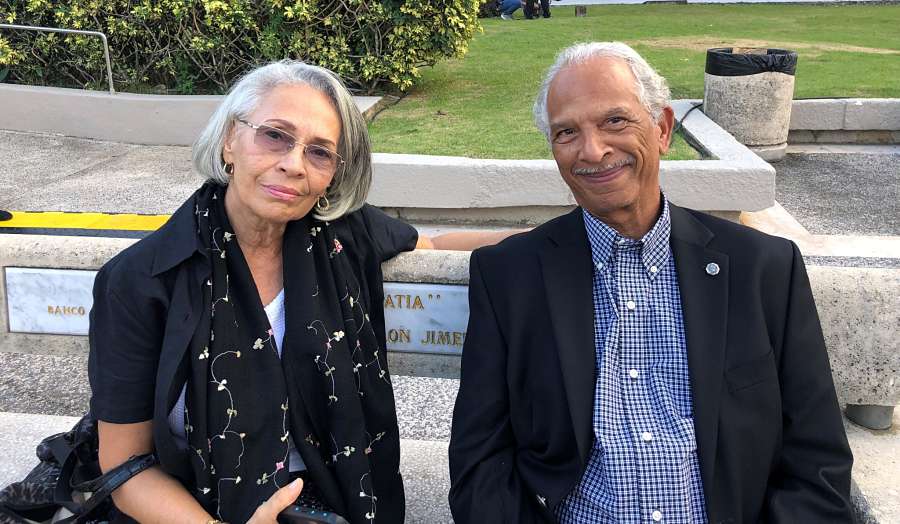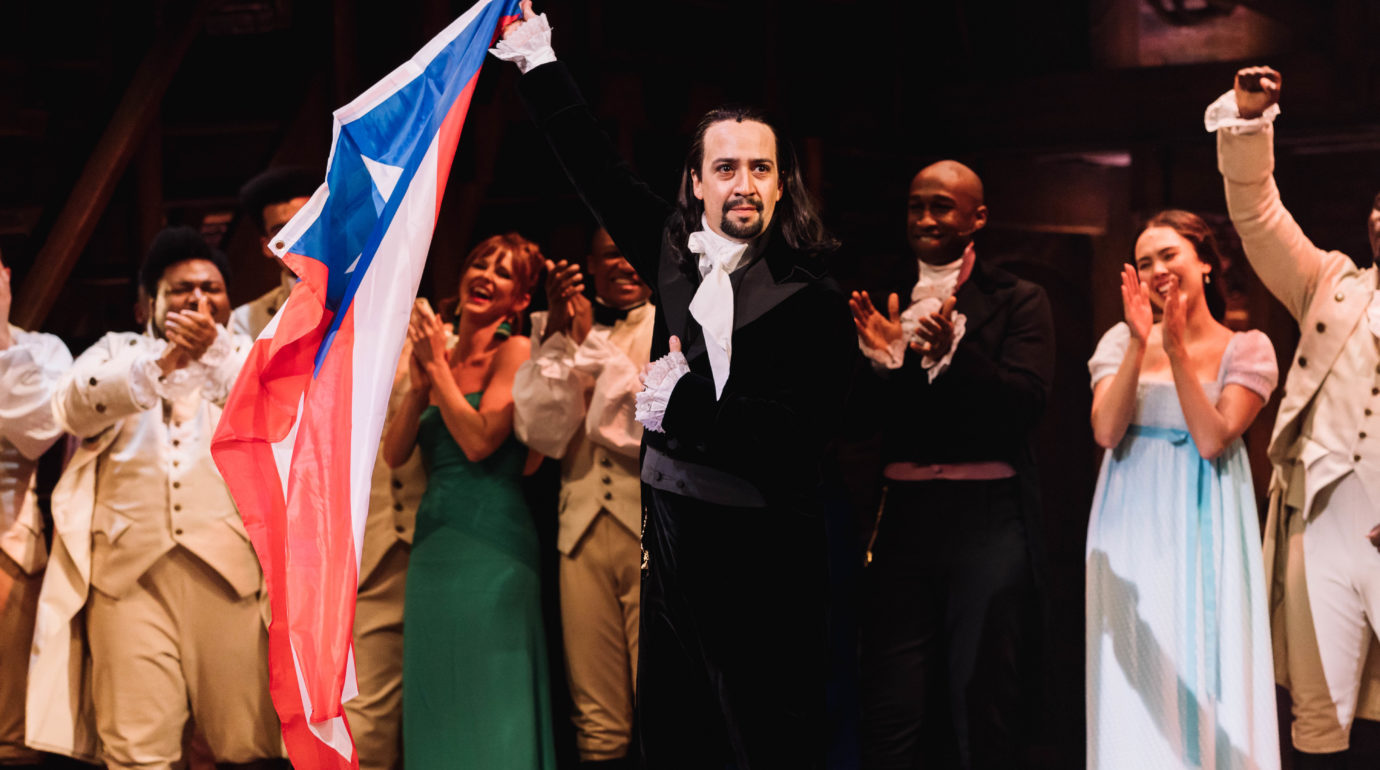On Jan. 11, Sariluz and Alfred Anduze drove three and a half hours from the coffee plantation town of Maricao, Puerto Rico, to San Juan’s Centro de Bellas Artes (CBA). They were trying their luck: Maybe they’d be able to get walk-in tickets to the opening night of Lin-Manuel Miranda’s Broadway sensation Hamilton, just arrived on the island for 23 performances. Maybe, just maybe, they’d get a chance to see the story of one of the United States’ so-called founding fathers, performed by a son of Puerto Rico, Miranda himself, in Puerto Rico.
Truth is, the Anduzes had been trying their luck for months. “From the moment the tickets got released,” said Sariluz. “After 15 minutes they were sold out.” Apart from the five months they were without power after Hurricane Maria, the couple had been following the show’s trajectory toward the island—an engagement whose proceeds would help re-fund the arts in Puerto Rico, as well as provide millions for hurricane relief.
“We know someone that lives in Lin’s building in New York, and we even asked him if he would leave a note on Lin’s door, but our friend said it didn’t work that way,” said Sariluz, shrugging. Still, on they went—this wasn’t just another play.
Sariluz was born in Puerto Rico and grew up in St. Thomas. But Alfred was born on St. Croix, the same island Alexander Hamilton grew up on. In St. Croix the memory of Hamilton is everywhere: The airport was once named after him, you can visit the Hamilton House , and there’s a popular landmark in downtown Christiansted where he supposedly grew up.
“My mother gave me his biography to read when I was 10,” Albert recalled. “He was a hero. He ‘invented’ the U.S. Treasury, and that a guy from St. Croix is on the $10 bill is still very cool.”

“I have a feeling this is going to happen today,” said Sariluz, as she waited on the bench for possible tickets to open up. Just in case she decided she would sign up for the lottery. Miranda and producer Jeffrey Seller had announced that 275 $10 tickets would be reserved every performance, available by lottery. To play you just had to be Puerto Rican. Of these cheap tickets, 1,000 would be set aside for Puerto Rican college students.
As the Anduzes waited, Jimmy Fallon ran by in front of them. He was recording his special on Miranda’s Puerto Rican production. Albert and Sariluz didn’t flinch. They had their eyes on the prize: Lin-Manuel himself.
This time Sariluz’s gut feeling turned out to be right. Just before the show she waved her hands excitedly: They got them, they got them—tickets! They walked in, excited, eager.
As always with any performance of Hamilton, the pre-show energy in the audience was high. It was when I saw the original cast perform in New York, but this time—the energy was on fire. A current, a buzz, a thing you can’t touch that vibrates through your body until you find yourself at the edge of your seat, waiting for the curtain to rise.
And the curtain certainly did rise. And when Miranda took the stage, the crowd carved out a pedestal of applause. So much so that he could not continue to sing for two minutes.
Inside that applause were so many layers. The aftermath of Hurricane Maria: its death toll of nearly 3,000 people, its economic blow of $43 billion. The fact that the show had to be moved from the University of Puerto Rico to CBA because of student protests and lack of safety. Depending on who you ask, these protests have their roots root in campus union demands, and among the students themselves, who are struggling to survive with rising tuition, slashes in aid, and the inability to access higher education due to federal cuts. Add to this the 22 people who have died in just the first few weeks of the year, victims of gang violence, daytime killings, and a crime wave that is terrorizing many Puerto Ricans.
It was all there, suspended in the air, when Lin-Manuel Miranda, buttoned up as Alexander Hamilton in revolutionary garb, entered the stage. At that moment the audience tapped into that atmosphere, into the clouds around them, and rained a whole lot of heart and soul onto Miranda. And Miranda did what every good performer does: He returned it, with love.
“I’ve never felt anything like that,” Miranda said post-show. “You put [the show] at this angle, and suddenly you see different things.”
In particular, he explained, he felt it in a song from the show called “Hurricane.” It’s a song about how Hamilton, grappling with what his adversaries knew about an extramarital affair he’d had with Maria Reynolds, hoped to write his way out of it, just as he wrote his way out of St. Croix, as an orphan, after yet another hurricane.
But from this angle, in Puerto Rico, it didn’t feel like a metaphor. Indeed Miranda couldn’t get through the song the first time he rehearsed it in San Juan.
“Because you all know better than I do what it’s like to survive a hurricane, the quiet after the storm—that’s what we felt out there in the Diaspora, the quiet,” Miranda said of the terrible period when folks in the continental U.S. couldn’t hear from loved ones on the island. “That quiet and that terror,” he continued. “I feel like I’m going back to Maria every time I sing it.”

As Hamilton washed over us in the audience, I thought of something Alex Lacamoire, musical director, conductor, and overall music man for Hamilton, told me in a conversation before the show. He said that what he does, for this show and for a living, is “pay attention to the individual parts of the music. It’s a constant code switching.” He has to be able to approach a piece from all directions, put himself inside all the instruments.
With this thought in mind, I listened to the instrumental part the audience was playing, along with those onstage, to string together the music of this night. Or of something bigger still—of America, that “great unfinished symphony.”
When Albert and Sariluz left the theatre, Hamilton lingered with them. They reached out to me the next day to make sure I understood. “I hope you could see,” Albert said, “the tears of joy that flowed freely after the performance.”
Not only could I see them; I felt them at my core. Because I’m a girl from Miami, who had come even further to see the show. Like Lacamoire I’m of Cuban descent, the daughter of two Cuban refugees.
When Miranda appeared onstage, and, later, when he pulled out the Puerto Rican flag during the curtain call—that flag, so close in semblance to the Cuban flag—when he covered himself with it, when he carried it on his back to a rising roar, I could feel the freedom of that flag flying, and also its weight—the responsibility it bestowed on the person it covered.
For this little Cubanita in the audience, the knot in my throat untied when I saw that flag. My insides started code switching from English to Spanish, Caribeña to Americana and back again, and my hands found themselves beating loudly, playing my part in the music we were all making together.
That’s what happens when someone takes a shot for all of us and shows the world who we really are. We rise up.
Vanessa Garcia is a playwright, novelist, and journalist. Her novel White Light was one of NPR’s Best Books of 2015.


